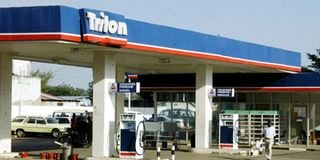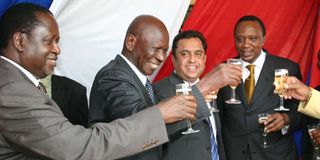Premium
As Devani signed oil deal, a full ship sailed into port

A Triton filling station near the Municipal Bus Park in Kisumu in this photo taken in January 2009.
In January 2009, then Energy minister Kiraitu Murungi was on holiday with his family in Mombasa, enjoying a well-deserved break from government business, when he received an urgent call.
On the other end of the line was Energy Permanent Secretary Patrick Nyoike, with two issues that urgently required the minister’s attention.
The country was witnessing a fuel shortage. Students going back to school and Kenyans returning to their work stations were stuck. Television and radio stations were broadcasting the situation in their news bulletins with alarming frequency.
There was, however, more shocking news.
Kenya Pipeline Company (KPC) had at the same time shut down its infrastructure and systems for stock taking.
“Who shuts down the country’s fuel distribution system in the middle of a shortage?” Mr Murungi, who is now the governor of Meru County, wondered.
Startled by the spectre of the country’s transport system screeching to a halt, Mr Murungi immediately cut short his holiday and travelled back to Nairobi.
Once in the capital, he summoned KPC Managing Director George Okungu and demanded answers on what was happening. Also present in that terse meeting was PS Nyoike.
In his defence, Mr Okungu told the minister and the PS that KPC had entered into Collateral Financing Agreements (CFAs) with local oil marketing companies (OMCs).
The agreements were to enable the OMCs to purchase petroleum products from overseas suppliers with financing from banks.

Former Vice-President Moody Awori (left) with Yagnesh Devani during a ceremony in 2006 to open Triton’s LPG depot in Nairobi.
KPC was then supposed to store the petroleum products as collateral, until the OMCs received sale approval letters from the financiers.
KPC’s operations department had, however, released 126 million litres of petroleum loaned to one of the OMCs, known as Triton, without the permission of the bank that had financed the company.
Shocked at what he was hearing, Mr Murungi ordered KPC’s board to meet and immediately give him answers as to why he had been kept in the dark on such a monumental policy move and was only learning about it when it had run into trouble.
The board met on January 7.
“A meeting was held and board members informed me they had been kept in the dark about the CFA and were, therefore, not aware of the release of the products,” Mr Murungi would later tell Senior Principal Magistrate Lucy Nyambura as a witness when the Sh9 billion Triton scandal first came to court.
“KPC held the products in trust for the financiers. Triton imported the products but under the CFA, KPC was to hold products and not release them until it got approval letters from the banks. There was a breach of contractual obligation,” Mr Murugi said of the decision by KPC.
But why had KPC’s management failed to discuss with the board or their parent ministry before implementing the CFAs if it was a good idea from the beginning?

Yagnesh Mohanlal Devani.
Ideally, such a huge undertaking that would pass the financial liability of lost stock to taxpayers in case there was a problem was supposed to be discussed at board level before implementation.
Worse, four years had already passed since the introduction of CFAs and none of the senior government officials at the Ministry of Energy were aware of their existence, only to be caught by surprise when things had gone wrong.
Triton scandal
It is the answers to these questions that investigators were seeking as they tried to find out who was culpable for the Triton scandal. What they found out was not only shocking, but puzzling.
There are two conflicting theories on where the idea of CFAs, which formed the basis of the Triton scandal, was conceived.
The first theory, which was advanced by KPC operations manager Peter Mecha, was that it is Triton that approached the oil company with the idea and that it took just weeks from conception to signing of the first agreement.
According to Mr Mecha, Triton’s CEO Yagnesh Devani proposed the idea to KPC’s Managing Director Shem Ochuodho and his assistant George Okungu at the beginning of July 2004. They both felt that it was a good idea.
The MD then tasked the operations department to begin drafting an agreement. “It is not clear to us as to the basis for the view that Mr Ochuodho and Mr Okungu appear to have taken, which is that the introduction of the CFA was a good idea,” investigators wondered in their confidential report, which the Nation has obtained.

Then Prime Minister Raila Odinga, Vice-President Moody Awori, businessman Yagnesh Devani and Finance minister Uhuru Kenyatta at a function during the grand coalition government. Mr Devani lived large and hobnobbed with the high and mighty in Kenya.
“There seems to be no upside for KPC in the deal, but potential downside in the event something was to go wrong in its administration,” observed the investigators.
On being questioned, Mr Okungu differed with his operations manager, claiming negotiations on the CFA had begun in 2003 and that KPC did not only talk to Triton about the idea, but other OMCs as well.
He also said the Ministry of Energy had been consulted through PS Nyoike, who thought it was a good idea. The PS, however, disagreed with Mr Okungu’s version of events.
“The first time I saw the CFA agreement was in late December 2008 in the wake of a crisis at KPC,” said Mr Nyoike.
That’s not all. Investigators also noticed another crucial contradiction in Mr Okungu’s version of events when they failed to find any evidence to show that the idea of CFAs had been deliberated for a whole year before being implemented.
Could not secure financing
Mr Okungu had told investigators that negotiations on the CFAs had started with various banks in 2003 when Linus Cheruiyot was the MD of KPC. From what he had gathered, some smaller OMCs had been licensed to import petroleum, but could not do so because they were unable to secure financing.
The only thing the KPC management seemed to agree on was that the first CFA was drafted at the beginning of July 2004 and that it was between Triton and KPC. The second CFA to be signed was between Kenol/Kobil and KPC.
Triton’s lender in its CFA with KPC was London-based Glencore Energy while Kenol/Kobil was to be financed by French international banking group BNP Paribas .
Triton and Kenol/Kobil were the only OMCs that had CFAs with KPC in the early years of the scheme.
“The CFA appears to have been hurriedly drafted and was noted to be weak. Subsequent reviews appear not to have adequately strengthened the agreement,” investigators, however, noted.
“Furthermore, there appears to have been no implementation plan in place when the CFA was introduced,” they added.
As for Triton, its CFA, which was the first to be signed, was drafted by the operations department at KPC. It was then sent to the legal department for review. Upon receiving it, Ms Nelly Mwathi, the KPC legal advisor, recommended that the financial aspects of the agreement be checked and cleared by the finance department.
After that the document was circulated to all the other managers for comments on July 5, 2004. It was then approved by the then MD, Dr Ochuodho.
Two days later, on July 7, Triton CEO Yagnesh Devani arrived at Kenpipe Plaza accompanied by his legal adviser Sunil Somala for the signing of their CFA.
KPC was represented at the signing by Dr Ochuodho, Mr Mecha and the acting company secretary, Mr Donald Kapten.
“KPC hereby consents to the security, which has been or will be granted by Triton to the bank (financier), including security over any of the Triton entitlement stocks, petroleum products in KPC’s custody under or in connection with the Transportation and Storage Agreement,” said one of the clauses in the CFA agreement between KPC and Triton.
First seedlings
“Triton shall advise KPC on the authorised signatories of the financiers to release such products on the account of Triton. Upon receipt of such authorised instructions, KPC shall release the so determined grade and quantity of products to Triton,” read another clause.
It is the events of that morning at Kenpipe Plaza that germinated the first seedlings of what would four years later snowball into the Triton scandal.
With pen put to paper, Mr Devani was finally back in the multibillion-dollar oil business, this time as a major league player.
At that time Triton only controlled one per cent of the petroleum business, courtesy of its petrol stations and a deal with Kenya Power that had since died with the exit of the Kanu regime.
But in his mind, Mr Devani was not intending to use his new access to finances to grow Triton’s market share. His company was already getting apportioned more than half of the storage space at the Kipevu Storage Facility (KOSF).
This was in total disregard of the law at that time that oil marketers should get apportioned space at KOSF in proportion to their market share.
With access to finances and the huge storage space his company already had at KOSF, Mr Devani moved fast to implementing his scheme, which neither KPC nor the banks that had agreed to finance Triton, knew.
The scheme was put in motion on the very day Triton and KPC signed the CFA. As Mr Devani, Mr Somala, Dr Ochuodho, Mr Mecha and Mr Kapten were at Kenpipe Plaza signing the CFA and posing for media cameras, a ship was already berthed at Kipevu.
The ship had petroleum products belonging to Triton, having been dispatched weeks earlier. Its contents were supposed to be covered by the very CFA that was being signed in Nairobi at that very moment.





